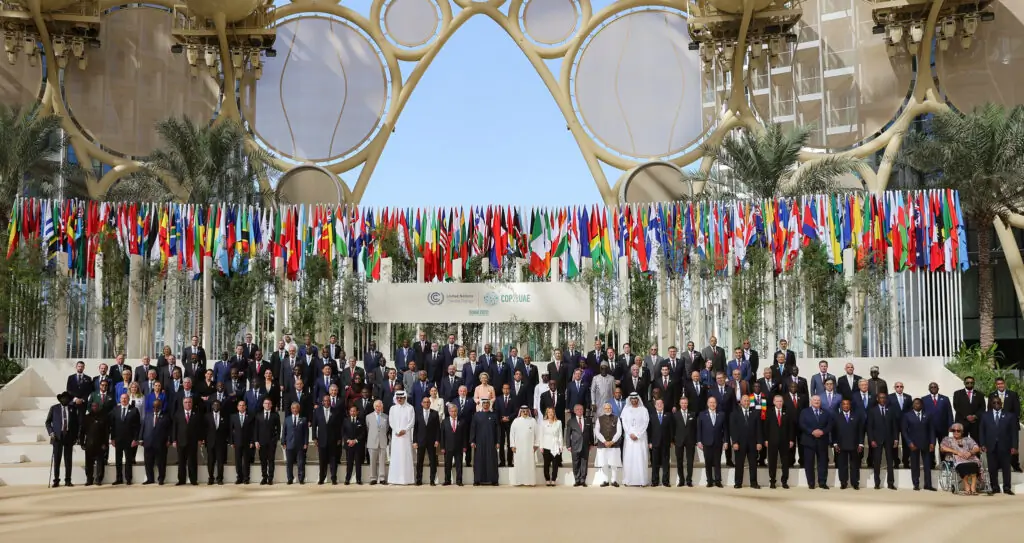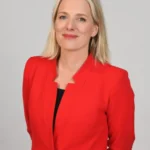
If you look at the widely circulated photo of leaders from the climate conference COP28 celebrating the UAE Consensus in Dubai, you would be forgiven for thinking that the negotiating process and its outcomes were almost entirely the result of the work of a small, elite group of men. And you would be totally wrong.
United Nations Climate Change Conferences or COPs (Conference of the Parties) are annual meetings where countries come together to try to agree on ways to address the climate crisis. My first COP was in 2015 in Paris, where, days after becoming Minister of the Environment and Climate Change, I was thrust into the negotiations for the Paris Agreement.
That agreement was historic – the first time the world came together to agree to limit global warming to as close to 1.5 degrees Celsius as possible and that each country needed to do its part to make that happen.
Beyond the ambitious agreement to tackle the climate crisis, what struck me most at these negotiations, and what has been very apparent since, is that women are driving the agenda for more ambitious climate action.
In Paris, leading women understood that it was not about what each particular country wanted from the Paris Agreement, but what we could ambitiously do together. We understood that taking action is about our children and our grandchildren and that the more we do now the better off the future generations will be.
I joined these women in successfully pushing very hard for an ambitious outcome. Women like Christiana Figueres, then head of the UN’s Secretariat on Climate Change, and a key player in negotiating the Paris Agreement with her blunt, no-BS attitude. Her call to action at the beginning of COP21 was a sobering reminder to all countries of the task ahead: “Never before has a responsibility so great been in the hands of so few.”
Laurence Tubiana, France’s ambassador for COP21, a giant in climate diplomacy and wearer of funky Converse shoes, was one of the key architects of the Paris Agreement. She is credited with the brilliant idea of bringing all the heads of state to Paris at the beginning of the conference rather than the end, putting pressure on the negotiators to get a deal after their leaders left.
There were so many other women, including many women Ministers like me, pushing hard for the 1.5-degree-Celsius temperature goal. Women activists, Indigenous leaders, business leaders, and youth all fought hard with us and we were not going to settle for just any deal.
I’ll tell you without a doubt, without that group of women, there is no way we would have landed such an ambitious global climate agreement.
Fast forward to COP28, where, unfortunately, only 10 per cent of heads of state were women. Despite often having lower profile roles, women were well represented at the negotiating tables and in the corridors and again were pushing hard.
One of the most high-profile examples of women not accepting excuses for delays or inaction was Mary Robinson, the first woman President of Ireland and former First UN High Commissioner for Human Rights.
In a tense discussion with Dr. Sultan Al-Jaber, the UAE President of the COP, Mary Robinson called for him to push for the phaseout of fossil fuels, noting: “We’re in an absolute crisis that is hurting women and children more than anyone … and it’s because we have not yet committed to phasing out fossil fuel.” In response, Al-Jaber grew testy with her, arguing that the science of 1.5 degrees does not require a fossil fuel phaseout and pushing back by stating that a phaseout of fossil fuels would not allow sustainable development “unless you want to take the world back into caves.”
Mary Robinson never lost her cool and continued to press him. Later Al-Jaber felt the need to call a press conference to clarify his remark which, as Mary Robinson noted, put the question of a fossil fuel phaseout front and centre in the negotiations.
Through many COPs and through my work, I’ve met so many intelligent, dynamic, and hardworking women across the world who are pushing, persuading, and fighting for greater climate action and a more just sustainable future for all.
We need to leverage their ambition and energy into action and concrete policy. That’s why I started Women Leading on Climate. I can’t wait for all we can do in 2024.








